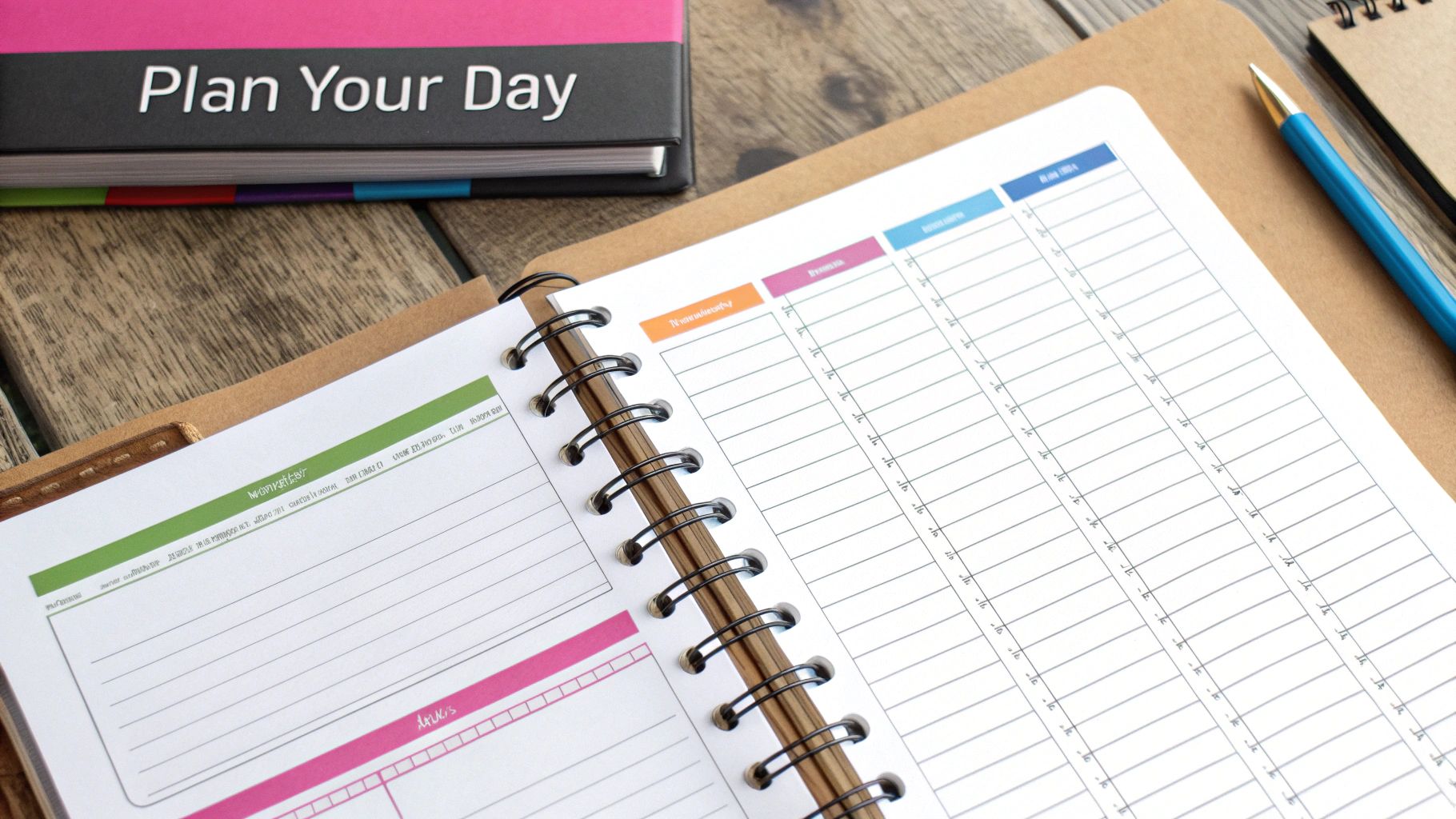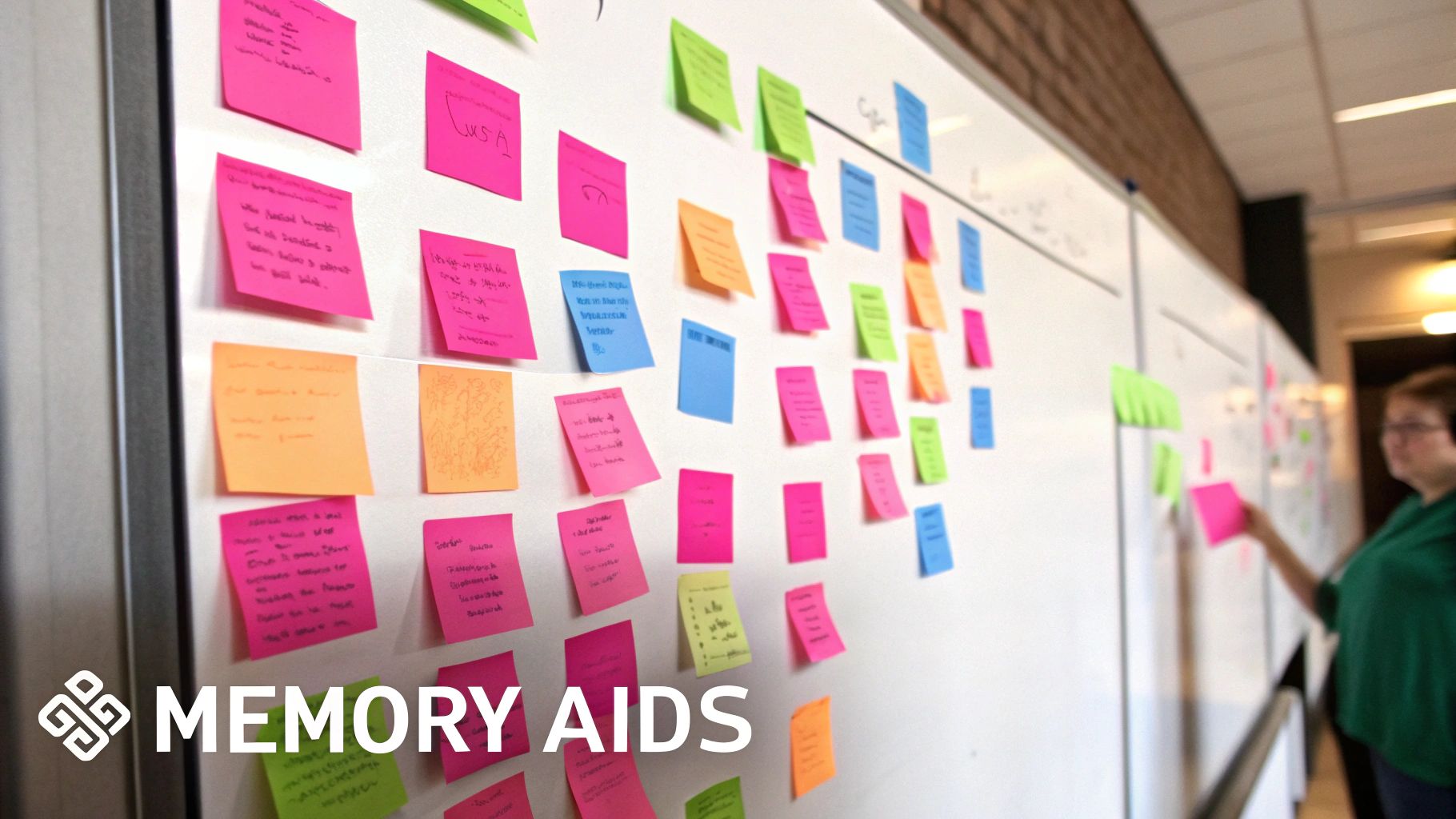
10 Research-Backed and Helpful Study Tips for Extraordinary Academic Success
Breaking Down the Science of Strategic Study Planning

Effective studying requires more than just scheduling time at your desk – it demands understanding how your brain best learns and retains information. By developing a strategic approach to studying, you can significantly improve how much you remember and how well you perform on exams. The key is combining proven learning techniques with your personal study preferences.
The Power of Planning and Self-Reflection
Research clearly shows the impact of strategic study planning. For example, a 2017 Stanford study found that college students who analyzed their study resources and explained why each helped them learn saw tangible benefits – scoring one-third of a letter grade higher than their peers on exams. The improvement came not from studying longer, but from studying more effectively by thinking critically about their learning process.
This reflective approach helps students become more aware of what works best for them personally. By paying attention to which methods help them learn and retain information most effectively, students can create study plans that match their individual needs. Understanding your own learning style builds confidence and reduces test anxiety since you know you're studying in ways that work for you.
Building a Personalized Study Schedule
Creating an effective study schedule means working with your natural rhythms and energy levels throughout the day. Some students focus best early in the morning while others hit their stride in the evening or late at night. Your schedule should align with when you're naturally most alert and productive.
For instance, if you're sharpest in the morning, tackle your hardest subjects then when your concentration is strongest. Save easier review tasks for later in the day when your energy naturally dips. This strategic timing ensures you're using your peak focus hours for challenging material that requires deep concentration.
Setting Achievable Goals and Avoiding Burnout
Breaking large study tasks into specific, measurable, attainable goals is essential for staying motivated and on track. Rather than a vague plan to "study chemistry," set concrete objectives like "review one chapter and complete practice problems." This allows you to track your progress and adjust your approach as needed.
Just as important as studying effectively is knowing when to take breaks. Regular periods of rest, adequate sleep, and maintaining healthy habits are crucial for learning and memory. Think of studying like athletic training – you need recovery time between intense sessions to perform at your best. Finding the right balance between focused work and strategic breaks will help you retain information better and study more productively over time.
Mastering the Art of Self-Testing and Active Recall

A strong study routine requires more than just creating schedules and reflecting on your learning – it needs active engagement with the material. Self-testing and active recall are two powerful techniques that help move information from short-term to long-term memory. When used consistently, these methods create deeper understanding and better retention than passive reviewing alone.
Why Self-Testing Matters
Self-testing is one of the most effective yet underused study methods. When you test yourself, you actively pull information from memory rather than just recognizing it. This mental effort creates stronger neural connections that make the material easier to remember later. For instance, if you're learning Spanish vocabulary, quizzing yourself on word meanings works better than repeatedly reading a vocab list. The challenge of recall is what helps cement the information in your mind. This principle holds true whether you're studying biology, history, math or any other subject.
The Power of Active Recall
Active recall takes self-testing a step further by having you retrieve information with minimal prompting. Rather than relying on multiple choice options or other hints, you practice recalling concepts completely from memory. This deeper level of retrieval strengthens your grasp of the material and helps you make connections between different topics. The more you practice active recall, the more naturally the information comes to mind – especially during high-pressure situations like exams.
Implementing Self-Testing and Active Recall: Helpful Study Tips
You don't need complex systems to use these techniques effectively. Here are some straightforward ways to incorporate self-testing and active recall into your study routine:
- Use Flashcards: Create cards with questions on one side and answers on the other. Quiz yourself regularly, making sure to try recalling the information before checking the answer.
- Practice Questions: Work through sample problems and essay prompts without looking at your notes. This simulates test conditions and reveals gaps in your knowledge.
- Create Your Own Quizzes: Develop questions based on your course materials. The process of writing questions helps you identify key concepts and how they connect.
- The Feynman Technique: Try explaining topics in simple terms as if teaching someone else. This exposes areas where your understanding needs work.
- Mind Maps: Draw visual diagrams showing how different ideas relate to each other. This helps you see the bigger picture and recall details more easily.
Tracking Your Progress
Keep records of which questions you get right and wrong during self-testing sessions. This information shows you exactly where to focus your study time. For example, if you consistently struggle with certain problem types or concepts, you can dedicate more practice to those areas. Regular testing and analysis lets you fine-tune your approach for better results. When you combine self-testing with active recall and careful progress tracking, you transform passive studying into an active learning process that leads to deeper understanding and improved test performance. This systematic approach puts you in control of your learning and helps you reach your academic goals.
Developing Rock-Solid Study Habits That Last

Success in academics requires more than just understanding concepts – it demands consistent, effective study habits that stand the test of time. While active recall and planning are important, the real key lies in developing behaviors that make productive learning a natural part of your daily routine. Let's explore practical ways to build study habits that last.
Structuring Your Study Time
The most effective students know that quality matters more than quantity when it comes to study time. Breaking your work into focused 25-50 minute sessions, followed by short breaks, helps maintain concentration and prevents mental fatigue. This approach, known as the Pomodoro Technique, has helped countless students stay productive. Another helpful practice is studying in different environments – moving between the library, a quiet café, and your home study space keeps your mind engaged and prevents boredom from setting in.
Engaging in Productive Group Discussions
When done right, studying with others can significantly boost learning outcomes. The key is ensuring everyone actively participates by explaining concepts, asking questions, and debating ideas. Try assigning specific roles in your study group – for example, have one person explain complex topics while another creates potential test questions. This collaborative approach helps identify gaps in understanding and strengthens everyone's grasp of the material. The process of teaching others is particularly valuable, as it forces you to organize and articulate your knowledge clearly.
Maintaining Effective Daily Reading Practices
Reading consistently is essential across all academic subjects, but how you read matters more than how much you read. Instead of passively scanning text, engage actively by highlighting key passages, writing questions in margins, and summarizing main points in your own words. Connect new information to concepts you already know by drawing parallels between different subjects. Creating mind maps can help visualize these connections. Research supports this approach – a 1994 National Center for Education Statistics study found that top-performing students typically read over 20 pages daily. This highlights why making focused reading a daily habit is so important.
Tracking Your Progress and Staying Consistent
Keeping track of your study efforts helps maintain motivation and identify areas needing improvement. Consider maintaining a simple study log where you record what you covered each day and how well you understood it. This gives you valuable insights into your learning patterns. For example, if your log shows you consistently struggle with certain topics after group sessions, you can adjust by spending more individual time on those areas. To stay consistent, especially during challenging periods, build in accountability by studying with others or joining a structured study group. Remember that rest is just as important as work – schedule regular breaks and prioritize sleep to keep your mind fresh and ready to learn. By following these practical approaches, you can develop study habits that serve you well throughout your academic journey.
Unlocking Your Potential Through Metacognitive Strategies

While good study habits and active recall are important foundations for academic success, taking your learning to the next level requires understanding how you think and learn. This concept, known as metacognition or "thinking about thinking," helps you become more aware of your learning process so you can optimize your study approach. By developing these skills, you can significantly improve how you learn and retain information.
Understanding Your Learning Process
The first step in using metacognition is understanding how you learn best. Some students grasp concepts more easily through visual aids, while others learn better by listening or doing hands-on activities. Consider when you feel most focused and productive – are you sharper in the morning or evening? By identifying these personal learning preferences, you can create study methods that work specifically for you. Just as athletes need training programs suited to their individual abilities, your study approach should align with how your mind naturally works.
Self-Reflection and Assessment
Regular self-reflection is essential for improving your learning process. After studying, take time to consider what helped you stay focused and what caused distractions. Were certain study techniques more effective than others? Did you struggle to remember particular concepts? By keeping track of these observations and reviewing your self-test results, you can spot patterns in what helps or hinders your learning. This information becomes your guide for making productive changes to your study routine.
Implementing Effective Strategies
Once you understand your learning style and areas for improvement, the next step is putting that knowledge into action. For example, if you notice you have trouble understanding complex topics, try explaining them in simple terms using the Feynman Technique. Visual learners might benefit from creating mind maps to organize information. If lecture material doesn't stick, recording classes for later review or adding diagrams to your notes could help. The key is experimenting with different approaches until you find what gives you the best results.
Building Metacognitive Skills for Long-Term Success
Developing metacognitive skills requires consistent practice and willingness to adapt your methods based on what you learn about yourself. The more you engage in self-reflection and adjust your study approach, the better you become at learning itself. This creates a positive cycle where understanding how you learn leads to better study habits, which builds confidence in tackling challenging material. These skills extend beyond academics – knowing how to learn effectively is valuable throughout your education and career. By making metacognition part of your regular study routine, you become more capable of handling new learning challenges as they arise.
Maximizing Retention Through Strategic Spaced Repetition
Want to move beyond basic study techniques? Let's explore spaced repetition – a proven method that helps you retain information for the long term. Instead of cramming the night before an exam, this approach provides a more effective way to learn and remember what matters.
Understanding the Spacing Effect
The spacing effect is a fundamental principle in how our brains learn and remember information. Research shows that spreading out study sessions over time leads to much better retention compared to studying everything at once. Think of it like exercising – short, regular workouts are more effective than one massive session. When you review material across multiple days or weeks, your brain forms stronger, more lasting memories of the concepts.
Implementing Spaced Repetition: Helpful Study Tips
To use spaced repetition effectively, review topics at gradually increasing intervals – first after a day, then three days, then a week, and so on. You can adjust these intervals based on how challenging you find the material. Here are key tips for success:
- Start Early: Begin using spaced repetition as soon as you learn new material, rather than waiting until just before exams.
- Use Flashcards: Tools like Anki make it easy to schedule reviews based on spaced repetition principles.
- Mix Up Topics: Study different subjects in each session instead of focusing on just one. This helps prevent false confidence from repeated exposure.
- Test Yourself: Combine self-quizzing with spaced reviews to identify knowledge gaps and strengthen your grasp of the material.
- Stay Consistent: Regular, spaced reviews work better than occasional intense study marathons.
Optimizing Your Study Schedule
Plan your study schedule to include regular review sessions. Here's an example of how to structure your week:
| Day | Topic |
|---|---|
| Monday | Introduction to Biology |
| Wednesday | Review Introduction to Biology, Chemistry Chapter 1 |
| Friday | Review Introduction to Biology, Review Chemistry Chapter 1, History Chapter 1 |
| Following Monday | Review Introduction to Biology, Review Chemistry Chapter 1, Review History Chapter 1, Biology Chapter 2 |
This approach lets you revisit earlier topics while learning new material. As concepts become more familiar, you'll need less time to review them, creating space for newer subjects. The structure prevents last-minute cramming and builds lasting understanding.
By making spaced repetition part of your regular study habits, you'll move from simply memorizing facts to truly mastering the material. These research-backed techniques will help you succeed academically while developing strong learning skills that serve you well beyond the classroom.
Making the Most of Academic Technology and Resources
Digital tools have made studying easier and more effective than ever before. However, with so many options available, it's important to select tools that match your learning style and support your study habits. Properly chosen resources can help you stay organized, engaged, and productive while avoiding common tech pitfalls.
Finding Your Ideal Note-Taking System
Good notes are essential for academic success. While traditional handwritten notes work well for some students, digital note-taking apps offer powerful features that can enhance learning. Evernote lets you organize notes into notebooks, add tags for easy searching, and record audio alongside written content – perfect for reviewing lectures later. Microsoft OneNote works especially well for visual learners, with tools for adding diagrams, images, and handwritten annotations directly into digital notes. The key is picking a system that fits your natural study preferences and helps you retain information effectively.
Tools for Managing Time and Tasks
Strong time management skills make a big difference in academic performance. Apps designed around proven techniques can help structure your study sessions for maximum impact. For instance, the Pomodoro method uses focused 25-minute work periods followed by short breaks. Apps like Forest and Focus To-Do turn this into an engaging experience that helps maintain concentration. Project management tools like Trello and Asana are great for breaking down big assignments into smaller tasks with clear deadlines. These tools help prevent overwhelm and keep you moving steadily toward your goals.
Working Together Through Technology
Studying with others can deepen understanding, and modern tools make collaboration seamless. Google Docs enables real-time group editing and discussion of documents, which works well for joint projects and study sessions. Communication platforms like Discord and Slack provide dedicated spaces for class discussions, questions, and peer support. For students who learn best by engaging with others, these tools create valuable opportunities to connect with classmates and strengthen comprehension through discussion.
Staying Focused in a Digital World
While technology offers many benefits, it's crucial to manage potential distractions. Social media notifications and constant emails can quickly derail concentrated study time. Consider using website blockers or app timers to limit access to distracting sites during study sessions. Remember that tech tools work best when used purposefully – choose resources aligned with your learning style, implement clear time management strategies, and create an environment that supports focused studying. This balanced approach allows you to get the most from educational technology while maintaining productive study habits.
Ready to transform your study sessions from tedious to engaging? Notescast, an innovative app, converts your notes and study materials into captivating videos using AI. Simplify complex academic papers into easy-to-digest videos, making learning 93% easier than traditional reading. Enhance retention and focus by over 90% while accelerating your learning process. Check it out at https://notescast.app/.
